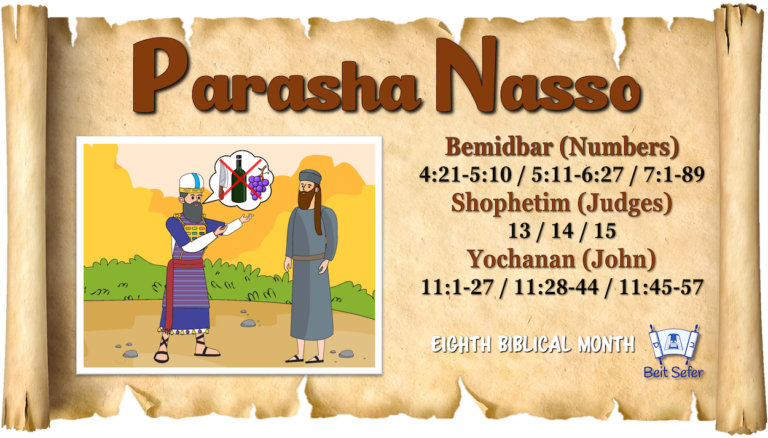Parasha Nasso – Year 2 – Nazirite: Promise of Total Dedication.
Shabbat Shalom, Nazarene family.
This week we will study the parasha Nasso, portion of year 2, we will see three key aspects: purity in relationships, special commitment to Yahweh and priestly blessing. First, laws are presented to maintain justice and purity within marriage, promoting trust and fidelity. Then, the vow of Nazirite is explained, an act of voluntary consecration that strengthens the spiritual bond with Elohim through the fulfillment of certain commitments. Finally, the priestly blessing is taught, a way of praying for protection, grace and divine peace over the people of Israel.
Bemidbar (Numbers) 6:8
8 All the days of his separation he [the Nazirite] shall be set-apart to Yahweh.
This week corresponds to the reading of the texts (in bold):
- Bemidbar (Numbers) 4:21-5:10 / 5:11-6:27 / 7:1-89
- Shophetim (Judges) 13 / 14 / 15
- Yochanan (John) 11:1-27 / 11:28-44 / 11:45-57
Summary of the weekly study, Year two:
Bemidbar (Numbers) 5:11-6:27
These verses teach about purity, consecration and divine blessing. The passage begins with the rite of jealousy, which seeks to resolve marital conflicts related to suspicions of infidelity, relying on Yahweh’s judgment to bring clarity and justice. Next, it addresses the vow of Nazirite, which allows individuals to consecrate themselves voluntarily to Yahweh for a determined time, assuming commitments such as abstaining from certain practices. Finally, the priestly blessing is presented, a prayer that prays for Yahweh’s protection, favor and peace over the people of Israel, highlighting the special relationship between Elohim and His people.
Shophetim (Judges) 14
These verses relate an episode in Samson’s life, where we see themes of destiny, choices and the power of Yahweh in the midst of complicated situations. Samson falls in love with a Philistine woman, disobeying the laws of Elohim by seeking to marry a foreigner. Along his journey, he kills a lion and, some time later, finds honey in its carcass, which causes a riddle at his wedding. This chapter shows how Yahweh, despite Samson’s decisions, uses even his mistakes and weaknesses to fulfill His purpose of delivering Israel from the Philistines.
Yochanan (John) 11:28-44
These verses narrate the resurrection of Lazarus and teach about compassion, faith and the power of Yeshua over death. Martha and Myriam [Mary], Lazarus’ sisters, express their grief over his death, and Yeshua is deeply moved by their suffering. Although Lazarus was already dead and buried, Yeshua asks them to trust, demonstrating that faith can overcome despair. Ordering the stone removed from the tomb, Yeshua prays and then calls Lazarus out, raising him from the dead. This miracle shows us the divine power of Yeshua and strengthens the belief in Him as the source of eternal life.
–
Enjoy this fun activity with the whole family. Inside you will find development questions for the three weekly sections (Torah, Haftarah and Brit Chadashah). While the older ones discuss the questions and their answers, the younger ones can color the picture related to the teaching, solve a maze, find the 7 differences and much more. We encourage you to do it week by week and instill in your children the habit of studying Yahweh’s word as a family.
We hope you and especially your sons and daughters enjoy this effort. For it is through the study of the Scriptures that we can come to understand the love and care that Yahweh has always had for us. And also to perceive that He has been taking care of even the smallest detail, so that we can take care and enjoy all that He gives us. That is why it is so important that our children learn and grow up knowing that they are loved by the Creator of all that exists.
Shalom.
To view the Tanach studies, click here
To view the Brit Chadasha studies, click here



